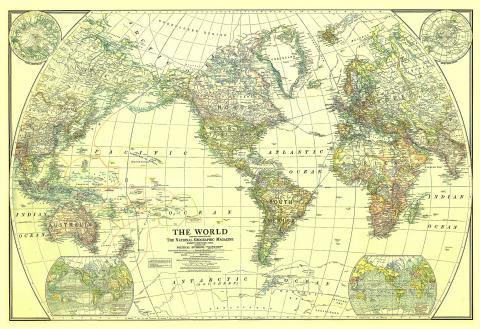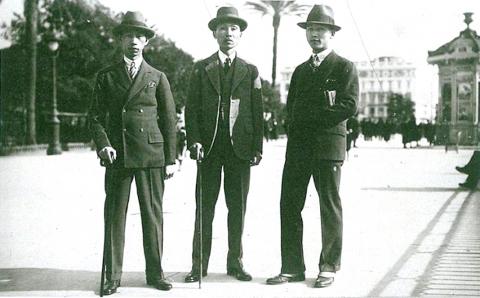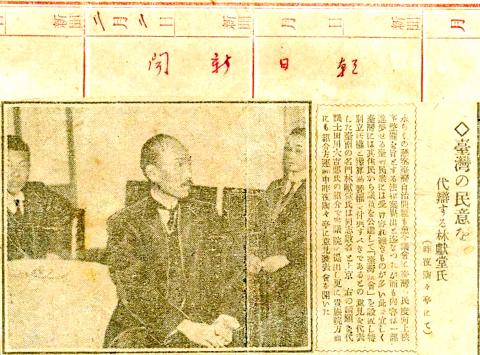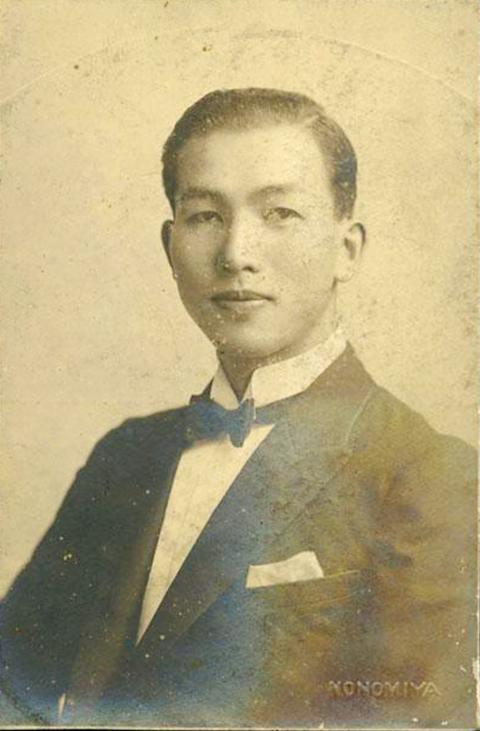Dec.10 to Dec.16
After several setbacks — including falling off a donkey and injuring his arm — Lin Hsien-tang (林獻堂) finally set out from Keelung on May 15, 1927 with his second son in tow. With his oldest son studying in London, Lin felt that this was the best time to fulfill his longtime dream of visiting Europe and the US.
Lin, a prominent political activist under Japanese colonial rule, was urged by his comrades not to take the trip. It was a crucial moment for Taiwan’s autonomy movement, as Lin’s faction had just quit the leftist-dominated Taiwanese Cultural Association (臺灣文化協會) in January, and was planning to form Taiwan’s first political party.

Photo courtesy of Wikimedia Commons
Lin writes in his diary that it was now or never for his journey, departing just two weeks before his associate and revered democracy pioneer Chiang Wei-shui (蔣渭水) founded what would become the Taiwanese People’s Party (台灣民眾黨).
Lin spent 378 days visiting more than 16 countries and 60 cities. His detailed travel accounts first appeared in the Chinese-language newspaper Taiwan Minpao (台灣民報) in August 1927, and ran until October 1931. Lin attempted to turn the material into a book, but died midway through the editing, leaving his secretary Yeh Jung-chung (葉榮鐘) to finish compiling Lin Hsien-tang’s Travel Writings from around the Globe (林獻堂環球遊記).
EMULATING THE WEST

Photo courtesy of National Central Library
Lin was heavily influenced by the travel accounts of Qing Dynasty scholar and reformist Liang Qichao (梁啟超), who fled China after his failed efforts to modernize the nation. When the two met in Japan in 1907, Lin asked Liang for his opinion on the future of Taiwan.
Liang suggested that Lin emulate the Irish struggle against British rule. This idea of taking inspiration from other countries’ experiences undoubtedly fueled Lin’s desire to see the West for himself.
Liang visited Taiwan in 1911 and further advised Lin to expand his horizons beyond literature, to closely study politics, economics and social thought.

Photo courtesy of Wikimedia Commons
Lin was one of the few Taiwanese who had the money and status to travel to the West, but he was not the first to write about his experiences.
Huang Chao-chin (黃朝琴), who would become Taipei’s first mayor under Chinese Nationalist Party (KMT) rule, studied at the University of Illinois in 1923 and also published an account of his travels in Taiwan Minpao.
Yan Kuo-nien (顏國年), a wealthy businessman from New Taipei City’s Rueifang District (瑞芳), set out from Keelung in 1925 but took the opposite route from Lin, heading east to the US first, circumnavigating the globe in about 220 days.

Photo courtesy of digitalarchives.tw
According to the book The Traveler’s State of Mind (旅人心境) by Lin Shu-hui (林淑慧), Yan’s account largely contains matter-of-fact observations of the economic, industrial and material development of the countries he visited. In contrast, Lin’s humorous and introspective prose focuses on values such as freedom and equality. This makes sense when considering their goals — Yan wanted to expand his coal-mining empire, while Lin had dedicated his life to the struggle for Taiwanese consciousness and autonomy.
“Lin’s prose reflected his deep feelings toward living under colonial rule,” Lin Shu-hui writes.
However, Yan’s book was meant for family and friends and was not widely publicized, whereas Lin’s book had “considerable influence” on Taiwan’s social and political movements, writes historian Hsu Hsueh-chi (許雪姬) in her introduction to the 2015 edition of Lin’s book.
“Lin was not a typical tourist… He hoped to learn about the strengths of Europe and the US to help Taiwan,” Hsu writes.
SOCIAL AND POLITICAL COMMENTARY
Lin’s first stop was Xiamen, followed by Hong Kong, Malaysia and Sri Lanka. He reached Europe on June 17, 1927, after riding camels and touring the pyramids in Egypt. He spent considerable time in London and Paris, using the latter as a base from which he explored the surrounding countries. It was from Paris that Lin set out on March 14, 1928, reaching New York in a week. After crossing the continental US, he returned to Asia via San Francisco. Although long-distance travel was mostly done by train and ship in those days, Lin jumped at the chance to take a plane for the first time in Los Angeles.
It’s impossible to cover all of Lin’s detailed and thoughtful observations. Probably the most interesting part is the social commentary that he provides, which closely mirrored his ideals as a political activist.
One notable passage is the one on the status of women in the US, which Lin thought was the highest in the world: “When a man meets another man in the street, they just nod to each other; whereas they will take off their hat when encountering a woman… If a woman enters a packed streetcar, the men will stand up and let her sit. It’s not just like this with the upper class, but throughout society. This is why there’s the saying, ‘To measure how civilized a country is, one just needs to look at how their women are treated.’”
Lin also muses on the prevalence of lynching black people in the US, writing: “It’s hard to believe that such inhumane practices are still taking place in plain sight in the 20th century.”
In the UK, he visited the execution site of Charles I, commenting: “He went against the will of the people and insisted on authoritarianism, and ended up losing his head. I wonder how many people in power around the world are still making the same mistake as Charles I? It’s so hard to comprehend!”
Lin does not make explicit his envy toward the intense debates at Speakers’ Corner in London’s Hyde Park, but it’s apparent in his prose: “After each speech, the crowd of thousands roar in applause. Four or five policemen can be seen, but they do not interfere. What freedom of speech they enjoy!”
Lin’s musings after visiting Monaco perhaps encapsulate his feelings as part of a colonized people: “Even though Monaco has little land, people and production, it’s ruled competently. This shows that there is no territory and no people in the world that cannot be independent. The only thing that matters is the people’s ability to govern themselves. If they can’t, then even a country as large and bountiful as India will be reduced to a colony.”
The book is truly a fascinating read and paints a picture of Lin that may be hard to glean from other historical materials. Unfortunately, it’s not available in English.
Taiwan in Time, a column about Taiwan’s history that is published every Sunday, spotlights important or interesting events around the nation that have anniversaries this week.

April 14 to April 20 In March 1947, Sising Katadrepan urged the government to drop the “high mountain people” (高山族) designation for Indigenous Taiwanese and refer to them as “Taiwan people” (台灣族). He considered the term derogatory, arguing that it made them sound like animals. The Taiwan Provincial Government agreed to stop using the term, stating that Indigenous Taiwanese suffered all sorts of discrimination and oppression under the Japanese and were forced to live in the mountains as outsiders to society. Now, under the new regime, they would be seen as equals, thus they should be henceforth

Last week, the the National Immigration Agency (NIA) told the legislature that more than 10,000 naturalized Taiwanese citizens from the People’s Republic of China (PRC) risked having their citizenship revoked if they failed to provide proof that they had renounced their Chinese household registration within the next three months. Renunciation is required under the Act Governing Relations Between the People of the Taiwan Area and the Mainland Area (臺灣地區與大陸地區人民關係條例), as amended in 2004, though it was only a legal requirement after 2000. Prior to that, it had been only an administrative requirement since the Nationality Act (國籍法) was established in

With over 80 works on display, this is Louise Bourgeois’ first solo show in Taiwan. Visitors are invited to traverse her world of love and hate, vengeance and acceptance, trauma and reconciliation. Dominating the entrance, the nine-foot-tall Crouching Spider (2003) greets visitors. The creature looms behind the glass facade, symbolic protector and gatekeeper to the intimate journey ahead. Bourgeois, best known for her giant spider sculptures, is one of the most influential artist of the twentieth century. Blending vulnerability and defiance through themes of sexuality, trauma and identity, her work reshaped the landscape of contemporary art with fearless honesty. “People are influenced by

The remains of this Japanese-era trail designed to protect the camphor industry make for a scenic day-hike, a fascinating overnight hike or a challenging multi-day adventure Maolin District (茂林) in Kaohsiung is well known for beautiful roadside scenery, waterfalls, the annual butterfly migration and indigenous culture. A lesser known but worthwhile destination here lies along the very top of the valley: the Liugui Security Path (六龜警備道). This relic of the Japanese era once isolated the Maolin valley from the outside world but now serves to draw tourists in. The path originally ran for about 50km, but not all of this trail is still easily walkable. The nicest section for a simple day hike is the heavily trafficked southern section above Maolin and Wanshan (萬山) villages. Remains of